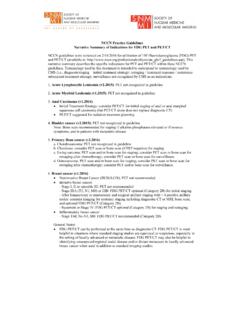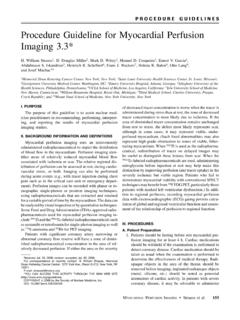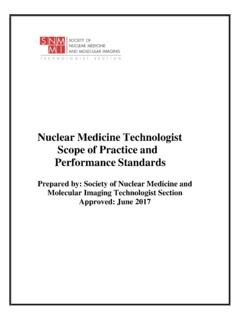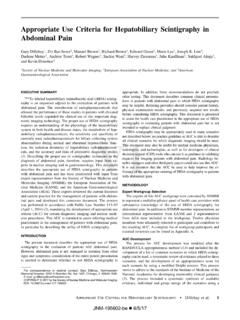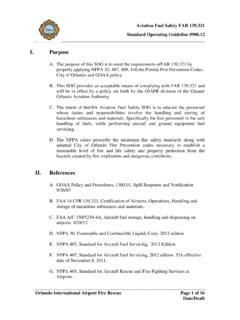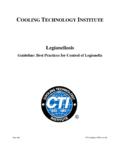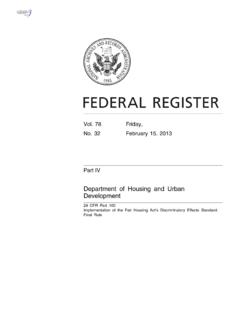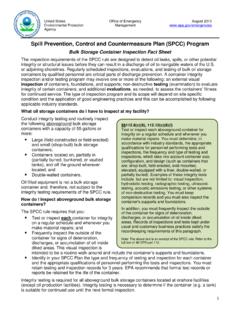Transcription of Procedure Guideline for Adult Solid-Meal Gastric …
1 Procedure Guideline for Adult solid -MealGastric-Emptying Study *Kevin J. Donohoe1, Alan H. Maurer2, Harvey A. Ziessman3, Jean-Luc C. Urbain4, Henry D. Royal5, and J. Martin-Comin61 Beth Israel Deaconess Medical Center, Boston, Massachusetts;2 Temple University Hospital, Philadelphia, Pennsylvania;3 Johns Hopkins University Hospital, Baltimore, Maryland;4 University of Western Ontario, Ontario, Canada;5 Mallinckrodt Instituteof Radiology, St. Louis, Missouri; and6 University Hospital of Bellvitge, Barcelona, SpainI. PURPOSEThe purpose of this Guideline is to assist nuclear med-icine practitioners in recommending, performing, interpret-ing, and reporting the results of Gastric -emptying andmotility studies in BACKGROUND INFORMATION AND DEFINITIONSR adionuclide studies of Gastric emptying and motility arethe most comprehensive and physiologic studies of gastricmotor function available.
2 The studies are noninvasive, use aphysiologic meal (solids with or without liquids), and arequantitative. Serial testing can determine the effectivenessof therapy. The Society of Nuclear Medicine (SNM) andthe American Neurogastroenterological and Motility Soci-ety have recently agreed on a standard meal and a standardimaging protocol for measurement of Gastric emptying. Therecommended meal is intended to simplify and standardizethe methodology and reference values based on a large,multiinstitutional investigation of 123 healthy standardization will alleviate the problem of compar-ing results between institutions that did not use the samemeal or imaging protocol. The detailed recommendationsfor the recommended meal and the imaging protocol can befound in the paper by Abell et al.
3 Listed in the bibliographyof this PROCEDURESA. Patient PreparationThe following summarizes the key recommendationsfrom the recent consensus Guideline (a sample patientinstruction sheet is included in the paper by Abellet al.).1. The patient should take nothing by mouth for aminimum of 4 h before initiation of the study. It ispreferable for the patient to take nothing by mouthstarting at midnight and then to be given the radiola-beled meal in the The patient should be advised of the logistical de-mands of the Procedure ( , the meal to be used, thetime required for eating the meal [,10 min] and forimaging, the number of images required, and what thepatient is allowed to do between images).3. Instructions for diabetic patients:a. Insulin-dependent diabetic patients should bringtheir glucose monitors and insulin with them.
4 Theserum glucose level at the time of meal ingestionshould be recorded and included in the final Diabetic patients should have their diabetes undergood control, with the blood sugar ideally lessthan 200 mg/dL. Diabetic patients should monitortheir glucose level and adjust their morning doseof insulin as needed for the prescribed Premenopausal women should ideally be studied ondays 1 10 of their menstrual cycle, if possible, toavoid the effects of hormonal variation on gastroin-testinal Prokinetic agents such as metoclopramide, tegaserod,domperidone, and erythromycin are generally stopped2 d before the test unless the test is done to assess theefficacy of these Medications that delay Gastric emptying, such asopiates or antispasmodic agents, should generallyalso be stopped 2 d before testing.
5 Some othermedications that may have an effect on the rate ofgastric emptying include atropine, nifedipine, pro-gesterone, octreotide, theophylline, benzodiazepine,and Medical History Pertinent to Performing theProcedureA sample patient information form is in the paper byAbell et al. The information to be gathered Jul. 1, 2009; revision accepted Jul. 1, correspondence or reprints contact: Kevin Donohoe, Beth IsraelDeaconess Medical Center, 330 Brookline Ave., Boston, MA : CAN ACCESS THIS ACTIVITY THROUGH THE SNM WEB SITE( ).COPYRIGHT 2009 by the Society of Nuclear Medicine, : Related diseasesa. Hiatal herniab. Gastroesophageal refluxc. Esophageal motility disorders ( , achalasia,scleroderma, diffuse esophageal spasm, or stric-ture)2. Previous interventionsa.
6 Medications ( , cisapride, metoclopramide,domperidone, or erythromycin)b. SurgeryC. Precautions/Contraindications1. Some patients may be allergic to the Fasting in diabetic patients may result in RadiopharmaceuticalsThe following standardized meal is recommended by theAmerican Neurogastroenterology and Motility Society andthe SNM. Reference values have been obtained through amulticenter trial. Use of a standardized meal will allowreferring physicians to compare results between institutionsmore easily and with less need to repeat the study when apatient is referred from an outside institution. If anothermeal is used, the reference values cited for this standardizedmeal do not Recommended meal:a. 118 mL (4 oz.) of liquid egg whites ( , Egg-beaters [ConAgra Foods, Inc.)]
7 ] or an equivalentgeneric liquid egg white)b. Two slices of toasted white breadc. 30 g of jam or jellyd. 120 mL of water2. Meal preparation:a. Mix 37 MBq ( 1 mCi) of99mTc-sulfurcolloid into the liquid egg Cook the eggs in a microwave or on a hot nonstickskillet (as described by Ziessman et al. [2007]).c. Stir the eggs once or twice during cooking andcook until firm to the consistency of an Toast the bread and spread the jelly on the The meal may be eaten as a sandwich to decrease thetime required for ingestion; if preferred, the eggs andtoast may be eaten dosimetry for a nonabsorbable solid labeledwith99mTc is presented in Table Image AcquisitionThe radiolabeled test meal should be ingested as quicklyas possible, optimally within 10 min. The technologistshould record how long it took the patient to ingest the mealand whether any portion of the meal was not eaten.
8 Themethod should be standardized as to environmental condi-tions, such as ambient noise, lighting, or other factorsaffecting patient comfort. The reference values are based onthis standard imaging methodology endorsed by the SNMand the American Neurogastroenterology and Images are obtained in a format of at least 64 64pixels using a general-purpose collimator or a low-energy high-resolution collimator. A 128 128 word-mode image matrix is recommended. The photopeaksettings are 20% at the 140-keV peak Anterior and posterior planar images (or a single leftanterior oblique image) with the distal esophagus,stomach, and proximal small bowel in the field ofview should be obtained for 1 min immediately afteringestion of the Repeated images are obtained in the same projec-tion(s)for1minathourlyintervalsup to4honthesame camera as was used for the initial images.
9 Ifimaging shows that more than 10% of the tracerremainsinthestomachat1,2,or3h,rece ntliterature cites the need to obtain images for up to4 h, suggesting that retention of more than 10% ofthe meal in the stomach at 4 h is abnormal and isalso the best discriminator between normal andabnormal results. Anterior and posterior views allowcalculation of a geometric mean (the geometricmean is the square root of the product of counts inthe anterior and posterior regions of interest [ROIs]),which more consistently represents the amount oftracer in the ROI, independent of anterior posteriormovement between the fundus and antrum. Thegeometric mean is preferably calculated fromanterior posterior data obtained simultaneouslywith a dual-headg-camera; however, sequentialanterior and posterior images from a single-headTABLE 1 Radiation Dosimetry: AdultsRadiopharmaceuticalAdministered activityUpper large intestine(organ receiving thelargest radiation dose)Effective doseMBqmCimGy/MBqrad/mCimSv/MBqrem/mCiNo nabsorbable solid labeled are fromRadiation Dose to Patients from Radiopharmaceuticals.
10 London, : ICRP;1988:226. ICRP Publication may also be used. Although some institu-tions acquire images in the left anterior oblique viewwith a single-head camera, this method is lessreliable in compensating for attenuation than is thegeometric mean Follow-up studies should always be done under thesame conditions as the first study ( , same meal,collimator, and analysis program)F. InterventionsA repeat of the Gastric -emptying study after a change insymptoms or therapy may be helpful for monitoringchanges in Processing1. An ROI is drawn around the activity in the entirestomach in anterior and posterior views (or the leftanterior oblique view, if acquired). The ROI shouldinclude any visualized activity in the fundic (proxi-mal) and antral (distal) regions of the stomach, withcare to adjust the ROI to avoid activity from adjacentsmall bowel, if possible.
